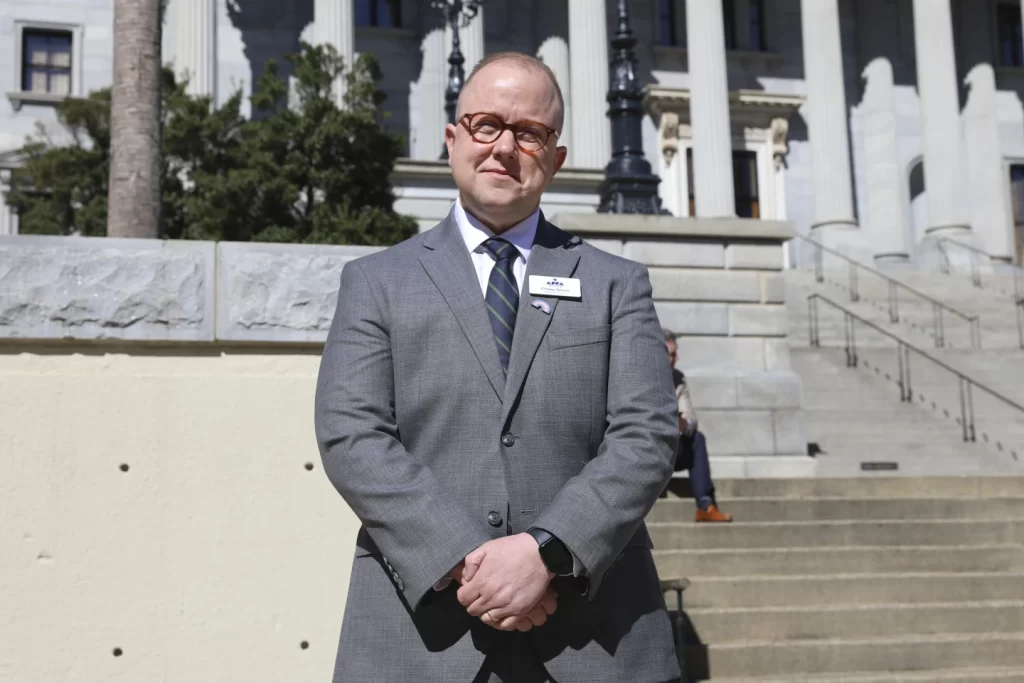
COLUMBIA, S.C. — Thousands of people in one of South Carolina’s most conservative counties roared when Donald Trump promised to cut federal funding on “Day 1” for schools pushing what he called “transgender insanity” onto children.
“And I can’t even believe I have to say it, but I do have to say it,” Trump told the crowd this month. “I will keep men out of women’s sports.”
The former president has repeatedly mocked transgender people during his campaign, using language about gender identity that LGBTQ+ advocates say is wrong and harmful. Others in the GOP field have attacked transgender participation in athletics and proposed nationwide bans on affirming care for transgender minors.
Transgender-related issues have become perhaps the biggest rallying call to Christian conservatives, more than abortion rights or same-sex marriage. That shift worries advocates who note transgender people are already disproportionately prone to stress, depression and suicidal behavior when forced to live as the sex they were assigned at birth.
“Republicans might be overplaying their hand as a political matter. As an ethical matter, I think it’s gross,” said Tim Miller, a former Republican political operative who worked as communications director for former Florida Gov. Jeb Bush’s 2016 presidential campaign.
The Alliance for Full Acceptance’s executive director, Chase Glenn, a transgender man, called it “dehumanizing” to have his existence politicized.
“It’s really disgusting that these politicians think they can use trans people, and more specifically trans youth, as a political tool to win points,” he said.
Many Republicans have been angered by how gender is sometimes discussed, part of a broader backlash against what conservatives see as a liberal tide in classrooms. Several people interviewed at a recent Trump rally argued children were being wrongly confronted with issues of gender identity.
“We shouldn’t have to think about it,” said Cheryl Savage, 59, of Conway. “We need to take care of our kids, right from schools, all the way up.”
GOP-controlled state legislatures have recently moved to dictate many facets of transgender life. At least 22 states have enacted laws restricting or banning gender-affirming medical care for minors. Bills governing school pronoun usage, sports team membership and bathroom access are back this year, as are efforts to restrict drag performances.
In South Carolina, one of the few Southern states without such health restrictions, the Republican-led Senate is considering a House-passed bill to ban gender-affirming care for minors. Opponents stretched the light pink, baby blue and white stripes of the transgender flag across the Statehouse steps this year to protest the measure.
Both Trump and Nikki Haley, his last major rival heading into South Carolina’s Republican primary this coming Saturday, have leaned into anti-transgender rhetoric.
Haley, a former South Carolina governor and Trump’s U.N. ambassador, frequently emphasizes to the “girl dads” in her home-state crowds that they cannot raise “strong women” if there are “biological boys playing in girls sports.” She has described the idea of “biological boys playing in girls sports” as the “women’s issue of our time.”
Trump, at an October event in Iowa, said transgender athletes were “very demeaning to women.” He went on to pantomime a young weightlifter struggling to heave heavy barbells as easily as her competitors “who transitioned.” He often repeats the act at rallies, sometimes adding that his wife, former first lady Melania Trump, tells him his impression isn’t presidential.
Research into the fairness of transgender-inclusive competitions is lacking. Virtually nonexistent are studies determining whether transgender athletes hold clear advantages over cisgender participants.
Trump has promised to pursue a range of other anti-transgender policies if he wins a second White House term. Proposals include banning federal money for any hospital that provides gender-affirming care to minors, ordering federal agencies to end any programs that promote sex or gender transition, and pushing Congress to ban chemical or surgical intervention for minors.
That’s despite endorsements from major medical groups, including the American Medical Association and the American Academy of Pediatrics, of transgender youth care as safe when administered properly.
Transgender people make up 5 of every 1,000 adults and 14 of every 1,000 youth age 13 to 17 in the United States, according to a June 2022 report from a UCLA Law think tank that researches public policy around sexual orientation and gender identity.
Meanwhile, the Biden administration has repeatedly delayed a new Title IX rule that would prohibit federally funded colleges from adopting “one-size-fits-all” policies categorically banning transgender student-athletes from playing on teams consistent with their gender identity. Such restrictions are in effect in about 20 states.
Data from Republican elections this year and interviews with Republican voters indicate the issue resonates with many in the GOP.
According to AP VoteCast, about three-quarters of Iowa Republican caucus participants said their local public K-8 schools are teaching “too much” about either gender identity or sexual orientation. In New Hampshire, 7 in 10 Republican primary voters said “too much” is being taught about gender identity in local elementary and middle schools.
Chad Connelly, the Republican National Committee’s former director of faith engagement who now runs an organization that politically mobilizes evangelical pastors, said many congregations are motivated by issues such as banning gender-affirming care for minors.
“Most pastors I know … they’re vehemently opposed,” he said. “They don’t believe it’s health care to let 8- and 10-year-olds make decisions about permanently altering stuff that shouldn’t be altered.”
Guidelines from leading authorities on gender-affirming medical care say surgery generally should be reserved for adults, with exceptions for older teenagers who meet certain criteria. Other treatments such as puberty blockers are not considered irreversible.
Tim Carter, 55, who described himself as Christian and runs an addiction recovery business, attended Trump’s recent rally in Conway. He and others said they agreed with Trump on banning transgender women from joining women’s sports — an opinion shaped in part by their faith.
Followers of Christ “love all people,” Carter said, but there are “some things you just can’t go over on.”
“When you start bringing that to our children in schools, you’ve crossed the line,” he said. “We need to raise our children, not others.”
Transgender access to sports, bathrooms and health care became the new keystone issue for the religious right after the U.S. Supreme Court approved same-sex marriage, said Jami Taylor, a University of Toledo professor of political science who researches policies related to LGBTQ+ rights.
The high court also overturned a federally guaranteed right to abortion two years ago, delivering a long-sought victory for conservatives but opening a wedge that Democrats have successfully centered in campaigns since. Republicans have been divided on whether to push for a national abortion ban, with Trump declining to publicly endorse the idea.
Between 2015 and 2020, party identification and religious attendance became much more predictive of someone’s opinions on transgender-related issues, according to research from Taylor and her colleagues. They found that those who frequently go to religious services and align with Republicans are less likely to support inclusive restroom access.
“You don’t want to talk about abortion right now if you’re a Republican,” Taylor said. “But you can get away with it more with trans (issues) and you’re throwing a bone to the same people.”
Mas Kono, a 60-year-old political agnostic, said the Republican messaging on transgender issues does not resonate with him at all. In the presidential contest, he reluctantly leans Biden but remains open to supporting Haley, whose rally he attended recently in Daniel Island, South Carolina.




